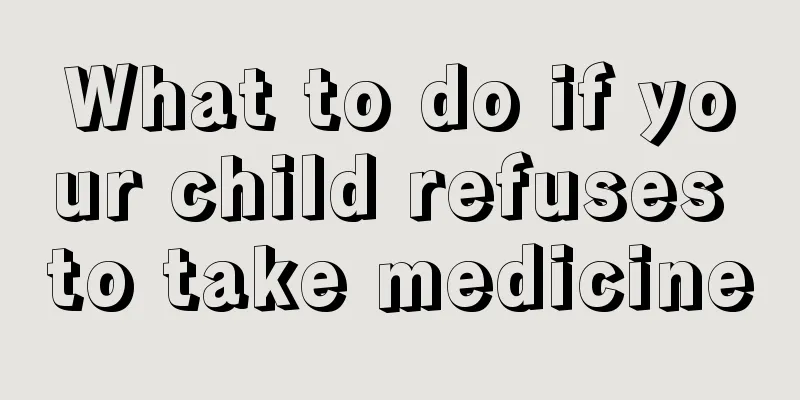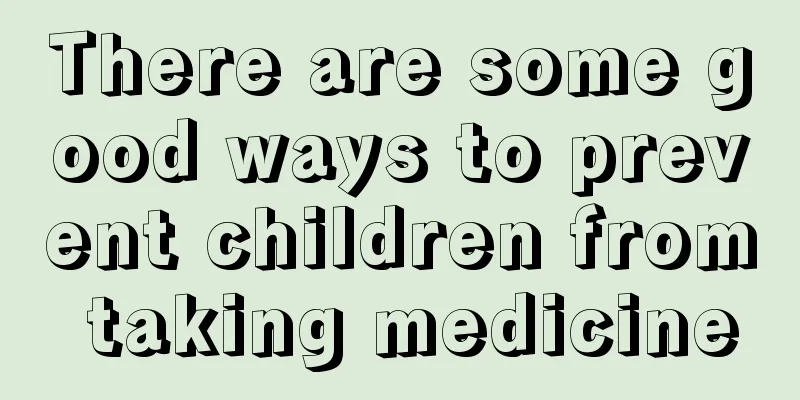What to do if your child refuses to take medicine

|
When a disease occurs in the body, you need to actively cooperate with the doctor's treatment in order to recover from the disease. In the treatment process, taking medicine is an indispensable key link. Most medicines are organic chemicals, so they taste bitter. This is also an important reason why people don’t like to take medicine. Children are prone to diseases such as colds, and they also need to be treated with medication. But what should I do if my child refuses to cooperate while taking medicine? Try giving a different medication of the same type. Similar medicines produced by different manufacturers have slightly different tastes. You can let your baby try similar medicines with different flavors. As long as they suit your baby's taste, he or she will naturally not resist taking the medicine. Give the medicine using a medicine dispenser or syringe. Slowly squeeze a small amount into the side of the baby's mouth or under the tongue. Do not squeeze it towards the throat to avoid choking the baby. Give the medicine with a spoon. After pouring the medicine into the spoon, put a little bit of soup that the baby doesn't dislike on the bottom of the spoon, wet his lips, and feed the medicine into his mouth immediately after he opens it. Divert your baby's attention. Before feeding the baby medicine each time, prepare a toy that the baby has never seen or played with before. One person can entertain him to divert his attention while the other person feeds him the medicine. Feed the patient medicine and water alternately. First give the baby a sip of water, then a sip of medicine. Before the baby can react to the taste of the medicine, immediately give him another sip of water. Alternate the water and medicine in this way. Add a little bit of rock sugar water to the medicine you feed your baby. Pinch the nose and inject medicine. This method is really a last resort. If all other methods have been tried and still don't work, this is the only way. Do not pinch your nose to administer medicine. Many parents like to pinch their children's noses to force medicine down their throats. This method is actually very dangerous. Although we pinch the child's nose, the child will still choke if he breathes through his mouth. Adopt correct posture . When parents feed medicine to their children, they must use the correct posture. Let the child turn his face to the side and then raise his head. Use a spoon to slowly feed the medicine into the child's mouth, press down the child's tongue and lower teeth, and take out the spoon after the child has finished swallowing. Tablets must be crushed. If the medicine given to children is in the form of tablets, we must first crush the tablets into small pieces, then re-open them with water or let the children take them directly after drinking water. |
<<: Symptoms of drug overdose in babies
>>: Breast milk jaundice has not subsided after 5 months
Recommend
Neonatal polydactyly
Some newborns are born with deformed parts of the...
What should I do if my two-year-old baby walks with his feet turned inward? Parents can do this!
When babies first start walking, they are very un...
When should children undergo phimosis treatment?
Genital development is very important, especially...
How to calculate the amount of milk powder for babies
As the baby continues to develop, it is necessary...
One and a half month old baby doesn't like to sleep
For babies, only normal sleep and sufficient rest...
What to do if a child falls and injures his head
Babies' mischief and ignorance are signs of t...
What to do if your one and a half year old baby has hernia
Children are most likely to get hernia when they ...
Why is my child's urine red?
If a child has any health problems, parents will ...
What to eat for children with acute gastritis
If a child has acute gastritis, please send him t...
Early education of language and crawling skills for one year and eight months old babies
A one year and eight month old baby is almost abl...
What are the symptoms of encephalitis in children?
Some children will have some acute infectious dis...
What are the symptoms and treatment of rubella in children?
The saddest thing is when children get sick, beca...
Children's facial features are inherited
Facial features are something that people attach ...
Baby's stool routine occult blood positive
The baby's physical health is the topic that ...
What are the symptoms of otitis in children?
Children with mumps are often called "big mo...









